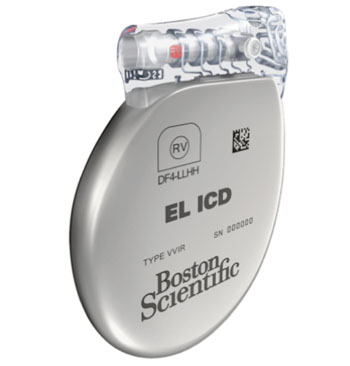New Battery Technology Extends ICD Longevity
By HospiMedica International staff writers
Posted on 17 Feb 2015
A new line of extended longevity (EL) implantable cardioverter defibrillators (ICD) could last nearly 12 years before needing repolacement. Posted on 17 Feb 2015
The Boston Scientific (Marlborough, MA, USA) DYNAGEN EL and INOGEN EL devices feature the EnduraLife battery, which uses superior manufacturing technology and high-performance chemistry to provide up to double the battery capacity of other ICDs. The small (29.5 cc) and thin (9.9 mm) high-energy device provides advanced heart failure (HF) monitoring, including remote patient management with weight scale and blood pressure sensors, and respiratory rate trend.

Image: The Boston Scientific EL ICD (Photo courtesy of Boston Scientific).
Other features include proprietary AcuShock Technology, which offers multiple options to reduce inappropriate and unnecessary shocks (including a choice of rhythm discriminators and antitachycardia pacing therapy in all rates zones, and advanced sensing and filtering); AV Search+ and RythmIQ to give clinicians options to appropriately manage RV pacing in patients with varying degrees of conduction block; and SafetyCore technology to provide lifesaving shock therapy and basic pacing functionality in the event of an unrecoverable fault.
“Boston Scientific is proud to build upon the world's most innovative ICD technology with the world's smallest ICD, the world's longest-lasting ICD, and the world's only subcutaneous ICD,” said Joe Fitzgerald, president of Rhythm Management and executive VP at Boston Scientific. “By providing a device with greater battery capacity, physicians are now able to offer patients a longer lasting device and increased peace of mind, while administrators and payors have new options to more effectively manage healthcare costs and minimize unexpected complications.”
“Battery longevity has a direct impact on patient outcomes and the cost of care,” said Samir Saba, MD, who implanted the first EL ICD at The University of Pittsburgh Medical Center (UPMC; PA, USA). “The EL ICD is an important advancement that can help minimize the frequency of avoidable replacement procedures to help reduce costs and the potential for replacement-related complications.”
An ICD resynchronizes the beating of the heart's lower chambers (ventricles), which often beat out of sync in HF patients, and provides a backup treatment option for sudden cardiac death (SCD). Studies have shown that ICDs can improve the quality of life for many patients with HF, a progressive condition in which the heart weakens and loses its ability to pump an adequate supply of blood.
Related Links:
Boston Scientific













.jpg)
